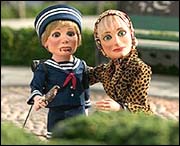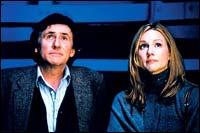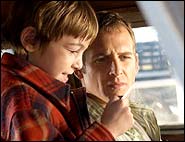 T
T
here is plenty of variety for movie fans in the US this week including a sweet but old fashioned story about a bored man trying to ignite his lost passion through dance (Shall We Dance?); a passionate story of an older woman falling for a man nearly half her age (ps); a drama involving generations of emotionally challenged men (Around The Bend) and a cartoon drama aimed at teenagers (Team America).
In the remake of the lean, beautiful and haunting Japanese film, an overworked and bored Chicago accounts executive (Richard Gere) sees a beautiful dance teacher (Jennifer Lopez) through a window and decides to take lessons from her.
His infatuation is challenged by the joy of dancing and slowly he wonders if his newfound hobby can save his strained marriage. As his skills develop, he also decides to enter the Chicago Crystal Ball Dance Competition.
Shall We Dance?, a remake of the 1996 Japanese film of the same name, stars Susan Sarandon as Gere's wife.
The Japanese movie, which was far less loud than the American version, was delicately performed, exquisitely rendered and was at once enigmatic and entertaining. There was also an air of innocence about it. The movie became a surprise hit in America grossing about $10 million.
This is not to say that the glossy American version, with plenty of old world songs, is charmless. It is curiously entertaining despite its predictability.
The reviews have been mixed, though some major reviewers like Stephen Holden of The New York Times had had no problem acknowledging that the film entertains.
The Atlanta Journal-Constitution felt the movie is 'well-meaning but overdressed Americanisation of the charming 1996 Japanese romantic comedy...'
While Hollywood Reporter's Michael Rechtshaffen complained that the movie is 'dishearteningly sullen, lead-footed misstep,' in The Times, Stephen Holden found it to be 'an old-fashioned feelgood fantasy that piles on the euphoria.'
But Kirk Honeycutt, reporting for the same publication, wrote 'it is only intermittently funny and truly does raise a question of how often can one resort to the same foul words for laughs without becoming tiresome.'
 There is certainly some novelty in the story of Team America, which is being shown in about 2,500 theaters and is the most widely released film of the week. It could be the second highest grossing film of the week, if it does not succeed in swallowing some of the box office magic off Shark Tale.
There is certainly some novelty in the story of Team America, which is being shown in about 2,500 theaters and is the most widely released film of the week. It could be the second highest grossing film of the week, if it does not succeed in swallowing some of the box office magic off Shark Tale.
A group of superhero-style characters travel across the world fighting terrorism. Among them is 'action hero' recruited for a special mission. The story is told with a combination of wood marionette-driven action scenes and rousing tongue-in-cheek musical numbers.
The Atlanta Journal-Constitution wrote: 'if you like your social commentary mixed with grade-school humour and shameless incivility, you'll laugh till you cry.'
And in Chicago Tribune Robert K Elder seemed to know why the film would work: 'You quite never know whose team they're on. And that's why kamikaze satire works...'
In the independently produced film, ps, which is far more intimate and engaging than other more expensive films, director Dylan Kidd extracts one of the most arresting performances in recent years by Laura Linney.
 Linney has a formidable resume that includes Clint Eastwood's hit Mystic River and the art-house hit You Can Count On Me that fetched her an Oscar nomination.
Linney has a formidable resume that includes Clint Eastwood's hit Mystic River and the art-house hit You Can Count On Me that fetched her an Oscar nomination.
The new movie also has a career-making performance by a relatively new actor Tophar Grace who had held his own opposite Michael Douglas in the hit film Traffic (2000).
Years after her high school boyfriend's death, Louise Harrington (Linney), an admission officer at Columbia University, is shocked to see an application. The picture of the applicant resembles her long dead boyfriend.
Louise, who is recovering from a failed marriage, openly and boldly welcomes the chance to love again. The complications that ensue are often unpredictable.
'The idea behind ps, was to tell a story where nothing stands between the heroine and her would-be lover,' muses Dylan Kidd. 'Even more so in this story, the universe works with the heroine, dumping the love object on her doorstep time after time! But is it possible that the only obstacle this heroine needs to overcome is herself, her own fears and anger?'
Novelist Helen Shulman who worked with Kidd in adapting her book of the same name as the film describes it as the story of a 30-something woman given a second chance at first love.
Kidd describes the film as 'a genuinely new kind of romance.'
'We are all familiar with the obstacles that can tear screen lovers,' he says referring to the classic screen tragedies ranging from Casablanca to Love Story to the recent Notebook. 'But what about the internal obstacles that keep people from connecting?' he asks.
Carefully and slowly, Kidd sets out to reveal how his heroine (and quite a few people around her) get locked up into such an emotional situation for years that they cannot easily accept good things that happen to them.
 A cast of good actors, especially Michael Caine and Christopher Walken, have invested considerable amount of talent in Around The Bend and save the film despite its contrived plot and melodrama.
A cast of good actors, especially Michael Caine and Christopher Walken, have invested considerable amount of talent in Around The Bend and save the film despite its contrived plot and melodrama.
The film, now in limited release, is about four generations of men who are suddenly brought together and are made to discover on a road journey a lot about their family's past. In the process, they learn considerably about their own selves.
Released by the newly created Warner Independent Pictures, this small budget film directed by first timer Jordan Roberts. It is the kind of film that needs plenty of good word of mouth to be a modest success and then make plenty of money in video stores.
Henry Lair (Caine) is on his deathbed and is tended by his thirtyish grandson, Jason (Josh Lucas), and his six-year-old great-grandson, Zach (Jonah Bobo). The family seems to be getting along well but when Turner (Walken) shows up, complications begin brewing.
Turner -- Jason's father and Henry's son -- had kept himself away from the family as he was battling his heroin addiction. And Jason had resented that. But Henry is only too happy to see his son who has been healing. But the scars won't go away easily.
When Henry dies, he leaves a will inside a Kentucky Fried Chicken bag, asking Turner to administer it. The survivors, it says, must take a road trip together, stopping off at KFCs to receive further instructions. As the three journey through a picturesque and often rugged landscape in New Mexico, the journey proceeds predictably. The trust between Turner and Jason gets slowly built.
According to the trade publication Hollywood Reporter, Jordan Roberts revised the script 32 times. While he has made the proceedings smooth, he has not been able to whip up enough conflict, irony and surprises to make this sentimental saga an edgy and colourful drama. Most of the film's colour comes from the landscape.
It is no big surprise that Caine, one of the most honoured artists of our time, gives one of his better performances. Without going overboard and whipping up adequate amount of pathos, he adds a bit of natural mischief to his character as per the script.
Walken, who is good from the start, shoulders the film after Caine's death in the film. As a shattered, guilt-haunted person, he gives one of his more compelling performances in years. His sensitive work here reminds us that he is one of Hollywood's many talented and proven actors who are under-used.
Walken, who broke into show business as a song and dance man, won the 1978 best supporting actor Oscar for his breakthrough performance in Michael Cimino's Vietnam-saga film The Deer Hunter. He has appeared in more than 50 films Quentin Tarantino's Pulp Fiction and in Steven Spielberg's Catch Me If You Can. But surely, we would like to see more of him.
Though the rest of the cast is more than adequate, the actors do not have much of a chance in the presence of Caine and Walken. Glenne Headly, who plays a Danish house servant, could have had a better-written part.

 T
T There is certainly some novelty in the story of Team America, which is being shown in about 2,500 theaters and is the most widely released film of the week. It could be the second highest grossing film of the week, if it does not succeed in swallowing some of the box office magic off Shark Tale.
There is certainly some novelty in the story of Team America, which is being shown in about 2,500 theaters and is the most widely released film of the week. It could be the second highest grossing film of the week, if it does not succeed in swallowing some of the box office magic off Shark Tale. Linney has a formidable resume that includes Clint Eastwood's hit Mystic River and the art-house hit You Can Count On Me that fetched her an Oscar nomination.
Linney has a formidable resume that includes Clint Eastwood's hit Mystic River and the art-house hit You Can Count On Me that fetched her an Oscar nomination. A cast of good actors, especially Michael Caine and Christopher Walken, have invested considerable amount of talent in Around The Bend and save the film despite its contrived plot and melodrama.
A cast of good actors, especially Michael Caine and Christopher Walken, have invested considerable amount of talent in Around The Bend and save the film despite its contrived plot and melodrama.